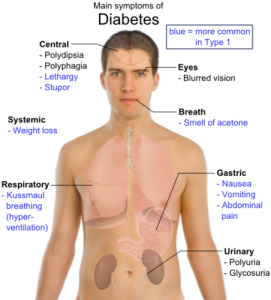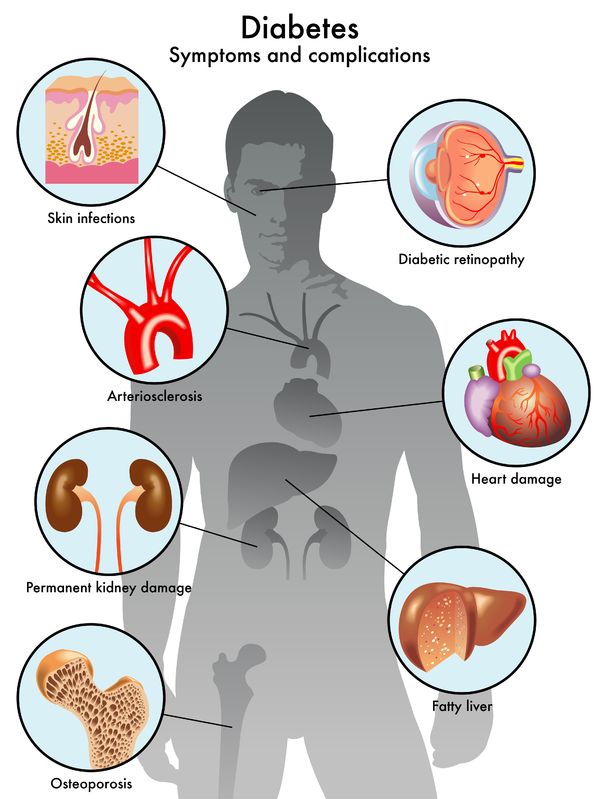Symptoms of Diabetes
 Diabetes has risen in rampancy of late. From adults to children and from Africa, to Europe and America, this diseases has increased everywhere in the world at an alarming frequency. Therefore, perhaps even before discussing the major symptoms, it is very important to know what it is all about. When one suffers diabetes, it means that their cells are not getting enough glucose due to lack of insulin or due to the body cells become resistant to insulin. Diabetes means that your cells are not getting enough glucose.
Diabetes has risen in rampancy of late. From adults to children and from Africa, to Europe and America, this diseases has increased everywhere in the world at an alarming frequency. Therefore, perhaps even before discussing the major symptoms, it is very important to know what it is all about. When one suffers diabetes, it means that their cells are not getting enough glucose due to lack of insulin or due to the body cells become resistant to insulin. Diabetes means that your cells are not getting enough glucose.
What is Diabetes?
For your daily activities you need energy. This energy is mainly derived from carbohydrates. When we eat carbohydrates through our diet, sugar levels in our blood rises. If it increases beyond 180 mg/100 ml, sugar is excreted in urine. Generally insulin, a hormone produced by the beta cells of the pancreas, helps to utilize sugar for the production of energy by the body. It helps in glucose intake by the cells and prevents rise in blood sugar thereby maintaining its normal level. The signs of diabetes are either the pancreas cannot produce enough insulin or whatever produced is not effective in controlling sugar levels. Insufficient insulin changes the metabolism of several nutrients which causes various bad effects.
Diabetic Causes, Symptoms and Suggestions

diabetes symptoms and complications
The most common symptoms are easy to tell. For instance, if you’re practically live in the bathroom, you know, for frequent urination, you probably have diabetes. The kidneys are overwhelmed by the presence of too much glucose and therefore they draw a lot of water from the kidneys to try dilute the glucose for easy passing out. This means that the bladder is filled fast and therefore you are always rushing to the toilet. This also brings another generic symptom of diabetes.
Too much thirst, the urge to drink water also comes because of the kidneys drawing too much water from the blood to dilute the glucose. When your body does not have enough water, you feel the urge to drink water frequently. If you have been getting too thirsty of late, then that could be an indication of diabetes. If the thirst and the frequent urination go hand in hand, then there is no doubt about it.
Fast weight loss is also one of the symptom. When you start losing weight unexpectedly, you need to arrange an appointment with your doctor immediately. When glucose is not taken into the cells for energy provision, the cells look for alternative ways of functioning and this leads to the breakdown of muscle in the body. It starts with the fat and after the fat is gone, the body starts eating itself, so to speak for energy and soon, the sufferer looks emaciated and weak.
Another sign of diabetic symptom is that you feel weak and tired for no reason. The reason is that the cells do not get the glucose that they are supposed to get so that they can provide the body with energy for its daily activities.
There are other common indications of diabetes, though they can be confused with other ailments and that is why it is very important for one to go for a clinical diagnosis. For diabetes Type 1, they include blurred vision, slow healing of cuts and bruises, nausea, dry mouth, itching in the groin area and others. For type 2 diabetes, other symptoms include yeast infections, dry mouth, and vaginal infections for women, blurry vision and some of the major symptoms shown at the beginning of the article. Should you experience any or a combination of the aforementioned symptoms of diabetes, see the doctor ASAP.
